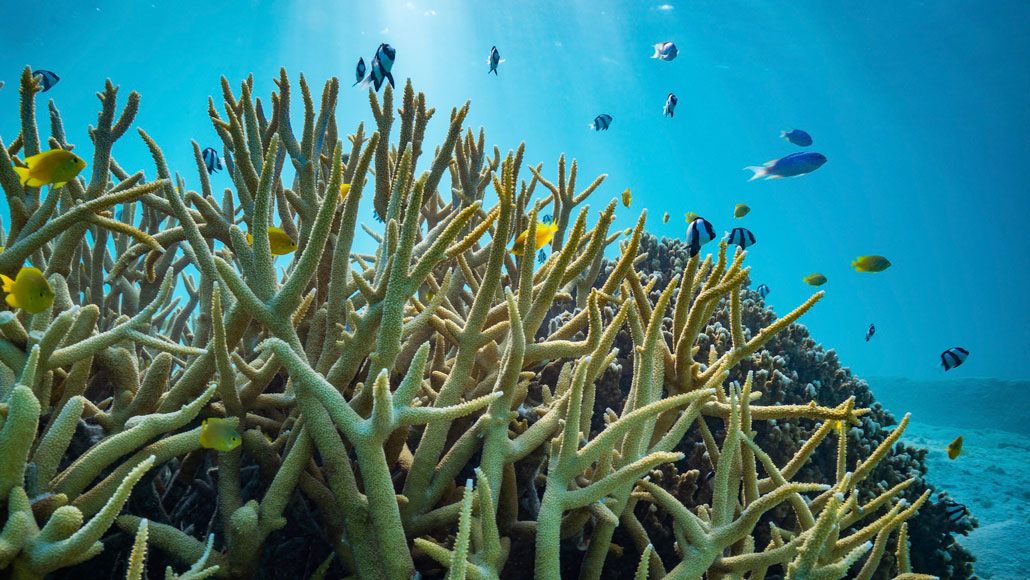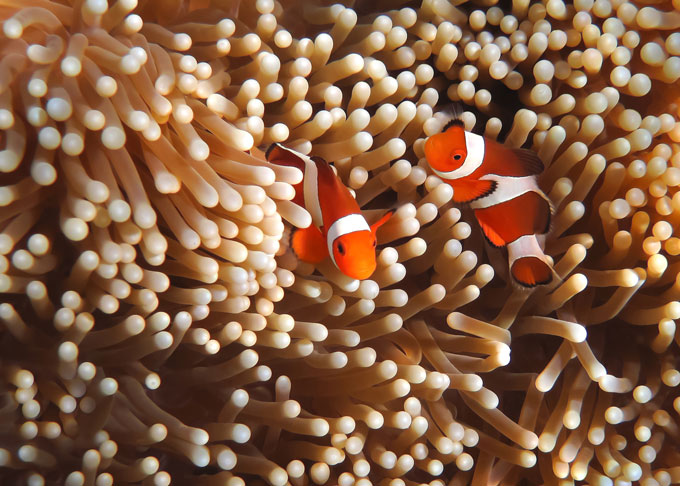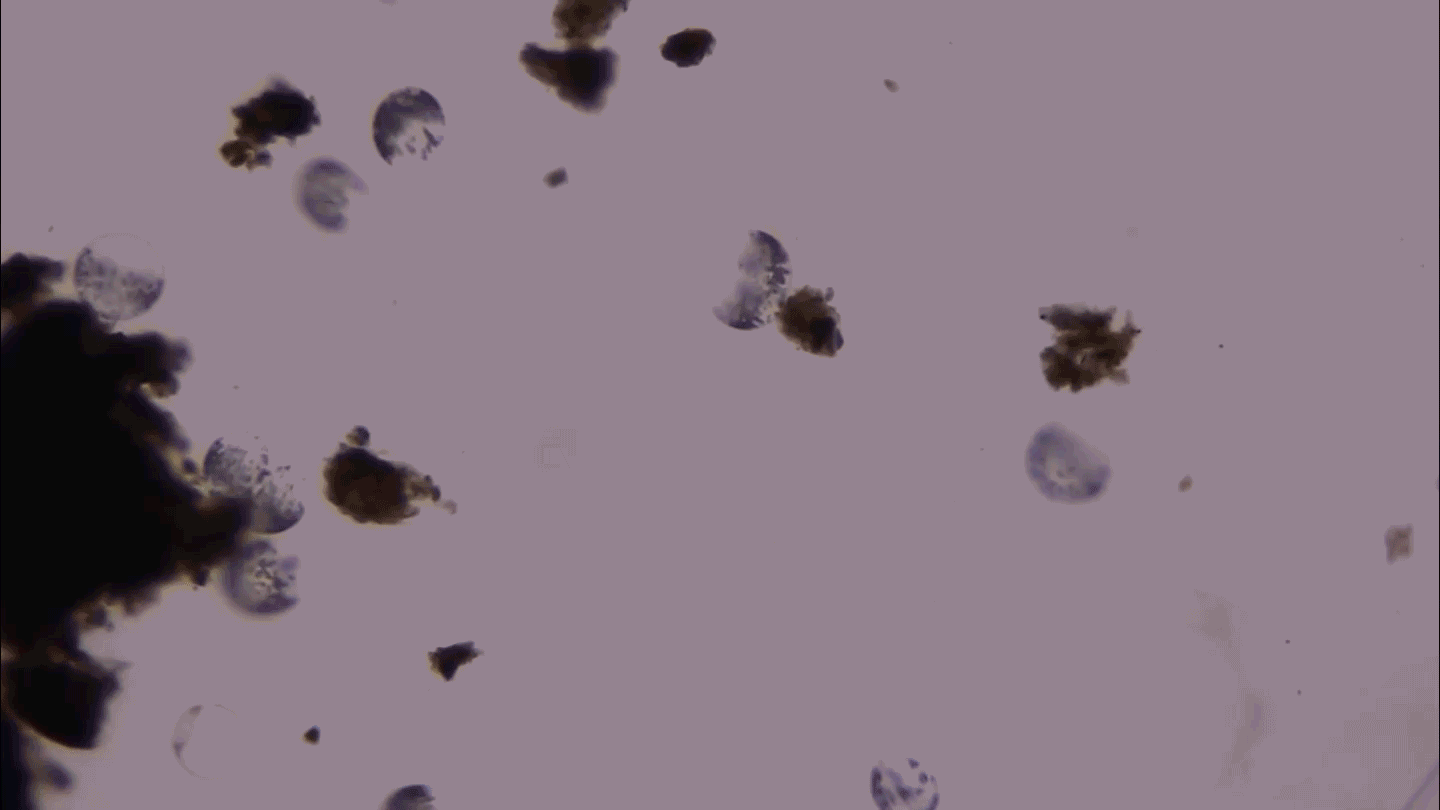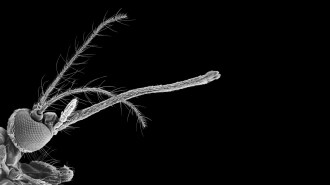Ocean acidification may not make fish act weird after all
New research upends earlier work on how ocean acidification might affect reef fish behavior

Damselfishes swim on the Great Barrier Reef in Australia. New research suggests that ocean acidification won’t impair these fishes' behavior, in contrast to earlier studies.
Fredrik Jutfelt/Norwegian University of Science and Technology
- More than 2 years ago
Climate change threatens coral reef fishes in myriad ways, but maybe not in all the ways we thought. Some studies have suggested that ocean acidification, one consequence of climate change, might warp fish behavior. But new research shows that fish may be far more resilient.
Scientists predict that as atmospheric carbon dioxide levels continue to rise, and oceans absorb even more, the waters will increasingly acidify. About a decade ago, a series of high-profile studies alarmed biologists with reports of severe behavioral impairments in coral fishes exposed to mildly acidified water. Larval fish lost the ability to smell predators and became dangerously hyperactive and confused when exposed to ocean acidification levels projected for 2100 if fossil fuel use continues at current levels (SN: 7/6/10). Research into the effects of ocean acidification then ballooned, becoming one of the most studied subjects in marine science.
But a three-year attempt to replicate and improve upon some of those earlier studies paints a starkly different picture. Tests of over 900 individuals from six different species of coral reef fish showed that exposure to acidified waters had no significant adverse effects on fish activity or predator avoidance, researchers report January 8 in Nature.
“Climate change is a huge threat to reef fishes,” says Timothy Clark, a comparative physiologist at Deakin University in Geelong, Australia. But “the acidification levels we’ll see by the end of this century aren’t going to have any real impact on fish, even beyond just coral reef fish.”
Other biologists question such strong statements. The study is the most robust yet to find no effect from acidification, and the researchers’ “data is unimpeachable,” says Andrew Esbaugh, a comparative physiologist at University of Texas at Austin who was not involved in this study nor in those this study sought to replicate. But because the study looked only at six reef fish species, “their conclusion that acidification won’t affect fish behavior is a bit of an overreach,” he says.
Alarming studies
Early research linking behavioral impairments to ocean acidification was dramatic. “These papers were, without a doubt, some of the most incredible things I’ve ever seen in biology,” Clark says.
One 2010 paper found a near complete reversal of chemical cue preferences after exposure to slightly acidified water. After just days, lab-reared larval clownfish became attracted to the scent of their predators, preferring it 90 percent of the time.

Another study that year found similar impairments in clownfish and damselfish. Up to 90 percent of exposed fish were gobbled up when transplanted to a live reef, compared with 10 percent mortality for fish never exposed to acidified water.
“These are just mind-blowing results,” Clark says. Studies since have reported more variability, including many seeing no effect from ocean acidification. But Clark and his colleagues wanted to replicate the earlier studies, he says, partly to understand the physiology behind these aberrant behaviors.
Differing conclusions
From 2014 to 2016, Clark’s team collected over 900 individuals from six different species of coral reef fish in Townsville, Australia, where much of the previous work was done. Most fish were wild-caught adults or juveniles, while a subset came from a local aquarium.
After the first round of tests on five species in 2014, the researchers did not see any effects. “At first I was quite skeptical of our results,” says Josefin Sundin, a behavioral ecologist at the Swedish University of Agricultural Sciences in Stockholm. If the effects are truly as severe as earlier studies found, she thought they should be easy to replicate.
Over the next two field seasons, the researchers tested even more fish, and at different life stages. Each experimental trial was recorded on video; automated tracking software was used to measure behaviors in an effort to improve upon previous, more subjective, methods of tracking, the researchers say.
All told, the study found little evidence that elevated CO₂ impairs fish behavior. Spiny chromis damselfish juveniles showed a slightly impaired ability to discriminate between predator and non-predator chemical cues. But other fish exposed to acidified waters avoided the scent of predators, like normal fish. The researchers also found little evidence of hyperactivity or other behavioral impairments.
“After three years of experimentation, we’re confident in our data,” Sundin says. These papers showing large effects from acidification are still being cited as the foundation of this field, she says. “If they’re incorrect, perhaps we should shift our focus to studying other climate change–related stressors besides ocean acidification,” such as heat waves, she says.
‘Apples to oranges’ or ‘to apples’?
Danielle Dixson, a behavioral ecologist at the University of Delaware in Newark, conducted some of the 2010 research while a Ph.D. student in the lab of Philip Munday at James Cook University in Townsville. She doesn’t question the new results, but says it’s not a fair replication. “It’s comparing apples to oranges,” she says.
Much of her team’s early work included clownfish, which the current study did not use. And these early studies used larval fish raised in the lab, while this study used mostly wild-caught adults or juveniles. “Those two groups have very different life experiences,” she says. “My fish were naïve to different acidification levels or predator cues, while wild-caught fish are not.”
Dixson notes that the field of ocean acidification’s effect on fish behavior has advanced significantly since these studies were published. “We’ve improved a lot on those early studies, and subsequent research suggests that the effects of ocean acidification may not be as drastic as initially reported,” she says. “That doesn’t negate the earlier work.”
But Clark and Sundin contend that their work replicated the crucial elements of earlier studies. They used four of the same species and tested some of the same life stages as previous work. While some earlier studies looked only at lab-reared fish, Sundin says the same research group and others also reported behavioral impairments from ocean acidification in wild-caught individuals in over a dozen published studies. “It’s certainly a comparison of apples and apples,” Clark says.
Howard Browman, a marine scientist at the Institute of Marine Research in Bergen, Norway, who wasn’t involved in any of these studies, calls the new paper “a healthy step forward in rebalancing the picture” of the effects of ocean acidification on fish behavior.
The field already is shifting towards the view that ocean acidification is one of many challenges fishes face from climate change, he says, and in many cases it’s probably less important than factors like ocean heat waves.







